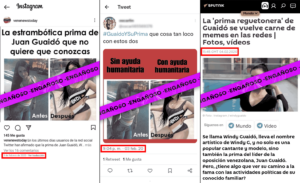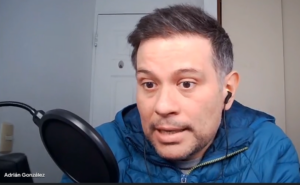Despite the challenges faced by Venezuelan journalists in accessing databases, the country's independent media continue to conduct exemplary data journalism investigations.
Venezuela's C-Informa fact-checking coalition won the Inter American Press Association's (IAPA) Excellence in Journalism Award in its data journalism category for the work "Uncovered: The disinformation factory on Instagram that threatens democracy in Venezuela."
The investigation won the recognition in September "for revealing the ways in which the disinformation strategy of Nicolás Maduro's regime operates on Instagram against the opposition; a convincing example of whistleblower journalism," the award jury said.
This fact-checking coalition was born in November 2022 with the goal of producing informative content to make known how disinformation operates in Venezuela. Less than a year later, the group earned its first international recognition.
The coalition includes media organizations like Medianálisis, Efecto Cocuyo, El Estímulo, Cazadores de Fake News, and Probox, and receives support from the Consortium to Support Independent Journalism in the Latin America (CAPIR, by its Spanish acronym), Chequeado from Argentina and DataCrítica from Mexico.
"We are very happy for several reasons. Above all because it is a media coalition that is really very interested in the problem of disinformation. There is a legitimate interest in understanding what is happening in the country. And not only to understand the disinformation coming from figures close to the government, but in general, from all sides," Adrián González, director of Cazadores de Fake News and author of the award-winning work, told LatAm Journalism Review (LJR).
González has been investigating disinformation by the Venezuelan government since 2020. That year, Cazadores de Fake News published a feature story on a "news" account on Instagram, allegedly from the opposition, that had been manufacturing disinformation, rumors and propaganda for months.

A "news" account on Instagram, allegedly from the opposition, manufactured disinformation, rumors and propaganda for months (Photo: Coalición Informativa C-Informa Venezuela).
This was the first in a series of stories that built up to the IAPA’s award-winning work, published in March 2023. At that time, Twitter (known as X today) had not yet limited access to its API [an intermediary software that allows two applications to exchange information], which benefited the team when downloading Twitter data for free.
"We thought we should go deeper into the subject, do a much more in-depth analysis of the data than we had already done. We knew that by digging deeper we were going to get something more, and in fact that’s what happened," González said.
The feature story identified a network of social media accounts that usually disseminate propagandistic content in favor of the government of Nicolás Maduro and against the Venezuelan opposition. These accounts, for the most part, posed as anonymous newscasters or influencers.
The process of identifying these accounts was not done automatically; it required a manual process of data collection.
"What we did was create a mega list of news outlets with a presence on Instagram. We did the same with Twitter by downloading data with the API, when it was possible. And the same on YouTube," Gonzalez said.
"We did continuous monitoring of all those accounts and over time we realized that there were news outlets that were always publishing disinformation," he added.
The team was able to see how fake news that started spreading on Instagram was then posted on Twitter and gained traction via hashtags. They also observed the use of “camouflage” which consists of hiding false content within a real news story.
Although in the story they were able to identify that it was an orchestrated network with the intention of spreading disinformation, they could not identify by name those responsible. "The story is an X-ray of something very sensitive that is happening but that continues to be covered up,” González said.
In Venezuela, the weakening of traditional media, censorship, the persecution of journalists, and a context of information control have been fertile ground for disinformation.

Adrián González, director of Cazadores de Fake News and author of the award-winning work. (Photo: Screenshot)
Moreover, investigating disinformation has its challenges. For Venezuelan fact-checker and member of the coalition, Jeanfreddy Gutiérrez Torres, the main barrier to investigate disinformation in Venezuela is the limited use of tools that allow the automation of data collection.
"Of the six Venezuelan fact-checking news outlets, only Cotejo is certified by the International Fact-Checking Network (IFCN) and therefore, it’s part of the Third Party Fact Checking Network of Meta, which provides two essential tools: the internal Facebook tool that allows tracking suspicious viral content on Facebook and Twitter, and the private tools of CrowdTangle. That makes researching disinformation for others only possible by building their own databases of what is received on Whatsapp (which does not allow tracking or metrics) or Telegram," Gutiérrez said.
Crisleida Porras, a freelance journalist with experience as a fact-checker at Univision Noticias' elDetector, agrees that being a verifier of information about Venezuela or investigating who is behind disinformation is not an easy task. For her, the greatest difficulty of working as a fact-checker in Venezuela is the lack of access to official sources.
"One of the pillars of fact-checking is transparency with the audience and the possibility that the data we present to support a verdict or rating (true, false, no evidence, lack of context, etc.) can be confirmed by those who consume our content," Porras told LJR. “If a fact cannot be supported by such verification, it casts doubt on the seriousness and meticulousness with which this verification is being done. And losing credibility is a risk that no journalist is willing to take, especially those of us who are doing fact-checking."